Regular Drain Maintenance: A Pro's Checklist to Keep Pipes Flowing Freely

Regular drain maintenance is essential for keeping your plumbing system in top condition. Over time, everyday activities like washing dishes, showering, or flushing waste can lead to gradual blockages.
Ignoring these early warning signs can cause costly repairs, inconvenient clogs, and even damage to your pipes. Understanding the importance of routine upkeep and knowing the key areas to focus on ensures that water flows freely and your home’s plumbing system functions seamlessly.
This article provides a detailed checklist for maintaining clear, efficient drains. You’ll learn how often to schedule professional drain cleaning, simple DIY methods to prevent clogs, and why improper disposal habits might cause recurring issues.
By taking a proactive approach, you can extend the life of your plumbing system and avoid unnecessary headaches!
How Often Should You Schedule Professional Drain Cleaning?
Professional drain cleaning is recommended at least once a year for most households. The frequency depends on factors such as the number of occupants, usage patterns, and the age of the plumbing system. Regular cleaning prevents minor debris from turning into stubborn clogs that can cause slow drains, backups, or damage to your pipes. Homes with large families or older plumbing systems may require bi-annual cleanings to keep everything flowing efficiently.
For commercial properties or homes with frequent plumbing issues, a professional inspection and cleaning schedule may need to be more frequent. Restaurants, for example, often accumulate grease and food debris in their pipes and may require quarterly cleaning. Professional plumbers use advanced tools such as hydro-jetting and drain augers to remove buildup effectively, ensuring a longer-lasting solution to clogs.
Routine professional cleaning also extends the lifespan of your plumbing system by eliminating blockages that cause pressure buildup. Consistent maintenance helps identify underlying issues early, saving homeowners from costly repairs.
What DIY Steps Can Prevent Clogged Drains?
Preventing clogs at home starts with simple habits that minimize debris buildup. One of the most effective steps is installing drain strainers in sinks, tubs, and showers to catch hair, food particles, and other debris before they enter your pipes. Cleaning these strainers regularly prevents any trapped material from decomposing and releasing unpleasant odors.
Another essential DIY measure is to avoid pouring grease or oils down the drain. Instead, allow grease to cool and dispose of it in a sealed container. Flushing drains with hot water and a mixture of baking soda and vinegar once a month can help break down minor debris and odors naturally. This method is gentle on pipes and environmentally friendly.
Regularly maintaining your garbage disposal also prevents clogs. Run cold water while operating the disposal, and avoid grinding fibrous or hard materials like eggshells, coffee grounds, and potato peels. These basic steps keep your drains clear and minimize the need for frequent professional cleaning.
Can Improper Disposal Habits Lead to Recurring Drain Issues?
Improper disposal habits are a leading cause of recurring drain problems. Everyday items like grease, coffee grounds, hair, and hygiene products can quickly accumulate in pipes, causing blockages that are difficult to remove. Unlike water-soluble waste, these materials stick to pipe walls and trap other debris, compounding the problem over time.
Many homeowners mistakenly flush "flushable" wipes or sanitary products down toilets. Despite being marketed as safe for plumbing, these items don’t break down easily and can create stubborn clogs. Similarly, pouring cooking oil or grease down the sink causes it to solidify within pipes, obstructing water flow and leading to slow drains or backups.
Recurring drain issues caused by improper disposal often require professional intervention. While DIY methods may provide temporary relief, repeated blockages indicate deeper problems that need expert solutions. Adjusting disposal habits and following proper waste management practices can significantly reduce the risk of recurring plumbing issues.
How Does Grease Buildup Affect Your Pipes Over Time?
Grease buildup in pipes is a common but serious issue that develops gradually. When hot grease or oil is poured down the drain, it may flow easily at first but begins to cool and solidify as it moves through the pipes. This solid grease clings to pipe walls, restricting water flow and trapping other debris. Over time, the buildup can create significant blockages that are challenging to remove.
The cumulative effect of grease buildup reduces pipe diameter, causing slow drainage and increased pressure within the plumbing system. Excessive pressure can lead to leaks, cracks, or bursts, particularly in older pipes. In severe cases, the only solution may involve pipe replacement or advanced cleaning methods like hydro-jetting.
To prevent grease buildup, homeowners should avoid pouring oil, fat, or greasy food remnants into the sink. Instead, allow grease to cool and dispose of it properly in a sealed container. Implementing this simple habit can protect your pipes and save you from costly repairs.
What Are the Risks of Neglecting Drain Maintenance?
Neglecting regular drain maintenance poses significant risks to your plumbing system and home. Minor clogs that are ignored can worsen over time, leading to slow drains, foul odors, and even wastewater backups. Severe blockages may require costly emergency repairs or replacements if they are not addressed promptly.
One of the most critical risks of neglect is water damage caused by leaks or overflowing drains. Blockages increase pressure within pipes, which can cause cracks or bursts, resulting in water damage to walls, floors, and other structural elements. Mold growth and property damage are common consequences of unresolved drain issues.
Routine maintenance, such as professional cleaning and regular inspections, reduces these risks. Identifying problems early prevents costly damage, ensuring the long-term health of your plumbing system. For ongoing maintenance, you can always consult with trusted plumbing experts like Drain Pro Plumbing! For more information about our professional plumbing services, please call us at 952-469-6999.